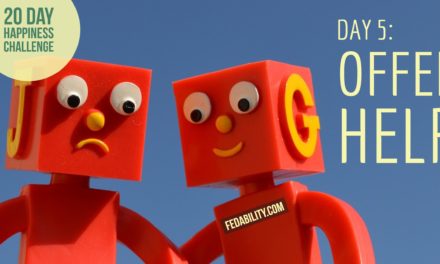Over the next three weeks, my family will be undergoing significant changes. We will be doing the usual holiday stuff. Which includes visiting multiple family members in various states, gift buying, cooking, and ‘relaxing’. But, on top of that we are moving. And, if that weren’t enough, we aren’t just moving like normal people. We’re downsizing to living on a sailboat which means selling, donating, and storing a majority of our possessions. Oh, and I’m closing out the year at work so they can proceed without me for the 3 weeks of ‘vacation’ that I’m taking off. To say that I’m barely keeping my head above water to manage the chaos of our lives is an understatement.
But, that’s my story.
My guess is that while your story is different, you too are looking for strategies for managing the chaos of the end of your year as well.
So I wanted to offer you a couple strategies to help you keep your head above water over the next few weeks – or whenever you find yourself sinking.
Strategy #1: Clear space
Perhaps I’m unique, but I find the more stressed I am the more my office and home become a disaster. You can excavate my work week by the piles of paper left on various sections of my desk. Or, walking in the door after work, you can follow the Hansel and Gretel-like trail as my shoes and bag are left at the door. My scarf at the next counter. My jacket on the first chair. And then you find me sprawled on the couch.
To manage the chaos, though, you’ll need to go against that natural inclination to let your office and home become a mess.
Research has found that that physical clutter around your office and home contributes to that internal, mental sense of chaos.
So, the first strategy to help keep your head above water is to clear one space that you regularly go into.
I know, I know. You don’t have time for that. But, believe me.
Try it.
Clear one space.
I did it this weekend. My house is a moving-disaster. But, I cleaned just a 3 foot space in the kitchen. And each time I went into the kitchen throughout the weekend, the sense of calm that I got was notable.
This evening, I was able to push some boxes into corners and vacuum just about 6 feet of the carpet of our entryway. And, again, there was this tangible relief. Relief that came from having just a small place that looked clean and I could walk through without having to step over or around a box or pile of something.
Strategy #2: Get it out of your head
The productivity guru, David Allen in his book Getting Things Done: The Art of Stress-Free Productivity, suggests that you have to get all the lists you have in your head – out. He argues that maintaining all of our various lists in our heads takes up cognitive space. Space that we need to actually do the things on our list.
If you’re someone who wakes up in the middle of the night worrying about all the things you have to get done – it may be because you’re maintaining that list in your head rather than on a list (paper or electronic).
So give it a try. Make a list of everything you have to do. No matter how small or how big.
Now, I will be honest.
I’ve done this activity on a single sheet of notebook paper.
By the end, I’d filled the page front and back – and all the edges – with all the things I had to do. Literally, there was no blank space left.
And then, I broke down into exhausted tears.
To see just how much was on my plate, in writing validated everything I’d been feeling up until that point. There was now a tangible piece of evidence of why I felt like I was drowning.
It was also a starting point to be able to look at that list more systematically. To see what had to be prioritized. Find things that could be delegated or removed from my list.
So those are two strategies that I’d offer to help keep your head above water. What strategies would you offer? Feel free to write them into the comments below.
Worried about your team’s ability to manage chaos? Check out our prior article about hiring strategies to make sure your team can handle it.





